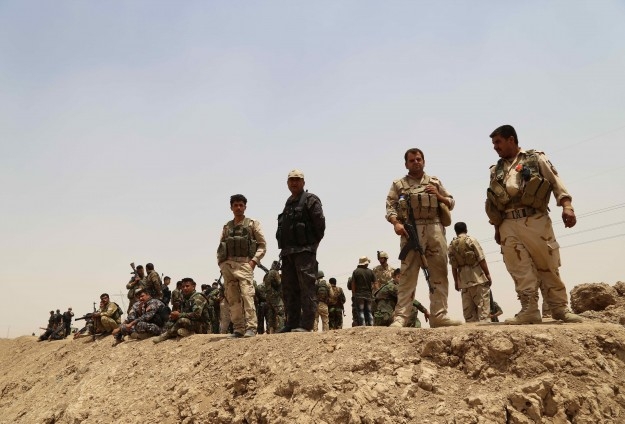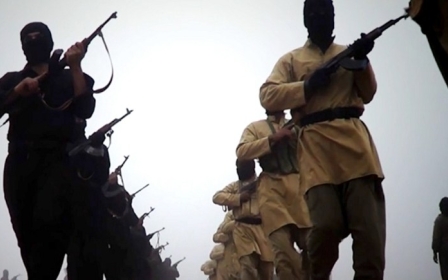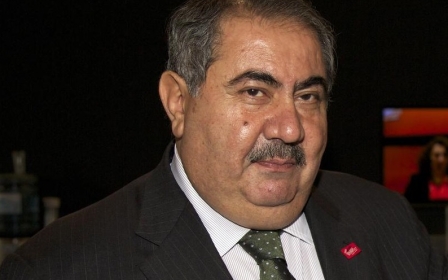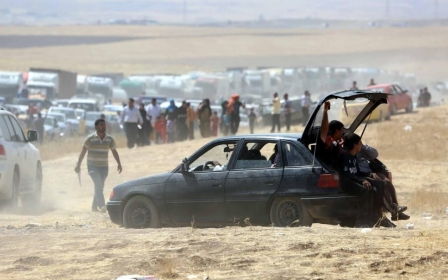Iraqi army makes gains but ISIL strengthens its hold over Fallujah

“Large numbers” of volunteers had been arriving in Samarra to join the fight, for the second day running, the head of operations in the city of Dujail, 60 kilometres north of Baghdad in Salah al-Din province, confirmed on Sunday.
The announcement comes as senior security officials said that troops loyal to the Prime Minister Nouri al-Maliki had killed 279 “terrorists” in the last 24 hours, which have seen the Iraqi army launch a major counter offensive against forced led by the Islamic State in Iraq and the Levant (ISIL).
The Syrian regime has also been carrying out air strikes against ISIL positions in Syria, hitting bases in Raqa and Hasakeh in co-ordination with Iraqi forces, according to the British-based NGO Syrian Observatory for Human Rights.
However, ISIL-led groups gains in made gains north of Fallujah, with a source telling Turkish news agency Anadolu that ISIL militants had taken control of large areas of the al-Sejer region north of the city virtually unopposed after Iraqi government troops withdrew “with no clear reason.”
ISIL also claimed to have executed 1,700 Iraqi soldiers in Salah al-Din province, directly north of Baghdad, posting unverified photographs on a social media account apparently run by the militant group. These reports have not been confirmed with Iraqi government officials casting doubt on suggestions of a mass execution by ISIL, although medical staff in Iraq’s second city Mosul which fell to the militants on Tuesday said that they had receiving the bodies of 128 military and police personnel on Sunday.
Violence also rocked the capital Baghdad, with two separate bomb attacks killing a total of 21 people and injuring 52. The second attack, a suicide bomb on Sunday afternoon, hit an area of central Baghdad near to the Shiite shrine of Sheikh Abdul Qadir al-Gilani.
The second bombing came after a press conference broadcast on state television in which Qassem Atta, the official spokesperson for the head of the armed forces Nouri al-Maliki, assured citizens that Baghdad was “100 percent safe.”
A mortar attack on Sunday morning also killed six people, including three Iraqi soldiers, at a volunteer recruitment centre in Diyala province, east of Baghdad.
International reactions
The scale of the conflict has fuelled widespread speculation about the prospect and extent of foreign intervention. Sunday saw reports that an elite Iranian general entered Iraq last week accompanied by 67 top advisers.
The Sunday Times quoted top Iraqi security officials as saying that Qassem Suleimani, who heads Iran’s Quds forces, was in charge of “deploying forces…and planning the battles” in Iraq.
After speculation on Saturday of a possible joint attack by Iranian and US forces against militants in Iraq, Washington announced the transfer of an aircraft carrier to the Persian Gulf.
The carrier, George HW Bush, received orders to move from the Arabian Sea to the Persian Gulf late on Saturday in order to protect “American lives, citizens and interests in Iraq.”
The Arab League has also condemned the violence in Iraq, calling for real dialogue and the formation of a government of national unity, according to pan-Arab daily al-Quds al-Arabi.
The statement came after an extraordinary meeting of the Arab League Council convened on Sunday in Jeddah.
Meanwhile Turkish Prime Minister Tayyep Erdogan warned that the crisis in Iraq “goes beyond” a fight between government forces and ISIL militants, and risks becoming “a sectarian conflict, or maybe even a sectarian war.”
Controversy over Kurdish gains
Official confirmation came on Sunday that Kurdish forces have been holding the Rabia border crossing between Iraq and Syria since 9 June. The secretary general of the ministry responsible for the Kurdish Peshmerga told AFP that Kurdish troops took control of the crossing after Iraqi forces withdrew.
Saturday night had seen an air assault by Iraqi forces near the eastern town of Khanqin, close to the Iranian border, which killed six Kurdish fighters.
It remains unclear whether the incident was a targeted attack or a case of friendly fire between the two forces, both of whom are opposing militant takeovers of major Iraqi cities.
Hanan Fatlawi, a member of parliament from the ruling State of Law coalition, accused Kurds from the autonomous region of Iraqi Kurdistan of involvement in a "conspiracy to bring down Mosul and occupy Kirkuk."
According to Iraqi news site al-Sumaria, Fatlawi said that Kurdish Premier Barzani's "dreams of partitioning Iraq and occupying parts of it will not be realised."
Her comments came amid intense media speculation that the Kurds could be realising a long-held “dream” of taking full control of Kirkuk. The city is considered the cradle of Kurdish culture by many and was captured by Kurdish Peshmerga forces on Saturday.
A representative for the ruling coalition of Iraqi Kurdistan, Latif Mustafa Amin, hit back at Fatlawi in a statement on Sunday afternoon, accusing her of “libelling” Kurds.
In his statement, he criticised Fatlawi, who he called “Fatnawi” or “spreader of discord”, for making these comments at a time when religious and political leaders have called for Iraqis to “avoid incendiary sectarian discourse.”
While yesterday fears were mounting that the militants may try to take the capital, their advances have slowed.
Maliki’s security spokesperson Qassem Atta held a press conference on Sunday to deny widespread claims that Iraqi soldiers were digging a trench around Baghdad to bolster it against militant attack, reports al-Sumaria. Atta also warned journalists that he would “bring to account those media outlets that spread false reports” saying that “security forces will take decisive action against all those who support terrorism.”
Earlier in the day state television channel al-Iraqia broadcast a special segment to upbraid media outlets including al-Jazeera, al-Arabiya and the Iraqi news channel al-Taghier for what it claimed was biased reporting of Iraqi unrest.
Attempts to pass a state of emergency which would give authorities sweeping powers failed on Thursday after not enough Parliamentarians showed up to vote but Maliki has since been granted “unlimited powers” by his cabinet in order to combat the crisis.
The Justice Minister Hassan al-Shamri has now called for an extension of his ministry’s powers to allow suspected terrorists to be sentenced to death, and to reject all appeals by suspected terrorists unless accompanied by “documents and evidence.”
In a statement released on Sunday, Shamri announced that “in the wake of the recent security breakdown, we must respond to terrorism on all levels, among them implementing the death penalty for terrorists.”
During a visit to Samarra on Saturday, Prime Minister Maliki warned that soldiers who participated in “treachery” by deserting their posts would be dealt with severely, with punishments that could include the death sentence according to Iraqi news site al-Sharqia.
New MEE newsletter: Jerusalem Dispatch
Sign up to get the latest insights and analysis on Israel-Palestine, alongside Turkey Unpacked and other MEE newsletters
Middle East Eye delivers independent and unrivalled coverage and analysis of the Middle East, North Africa and beyond. To learn more about republishing this content and the associated fees, please fill out this form. More about MEE can be found here.




